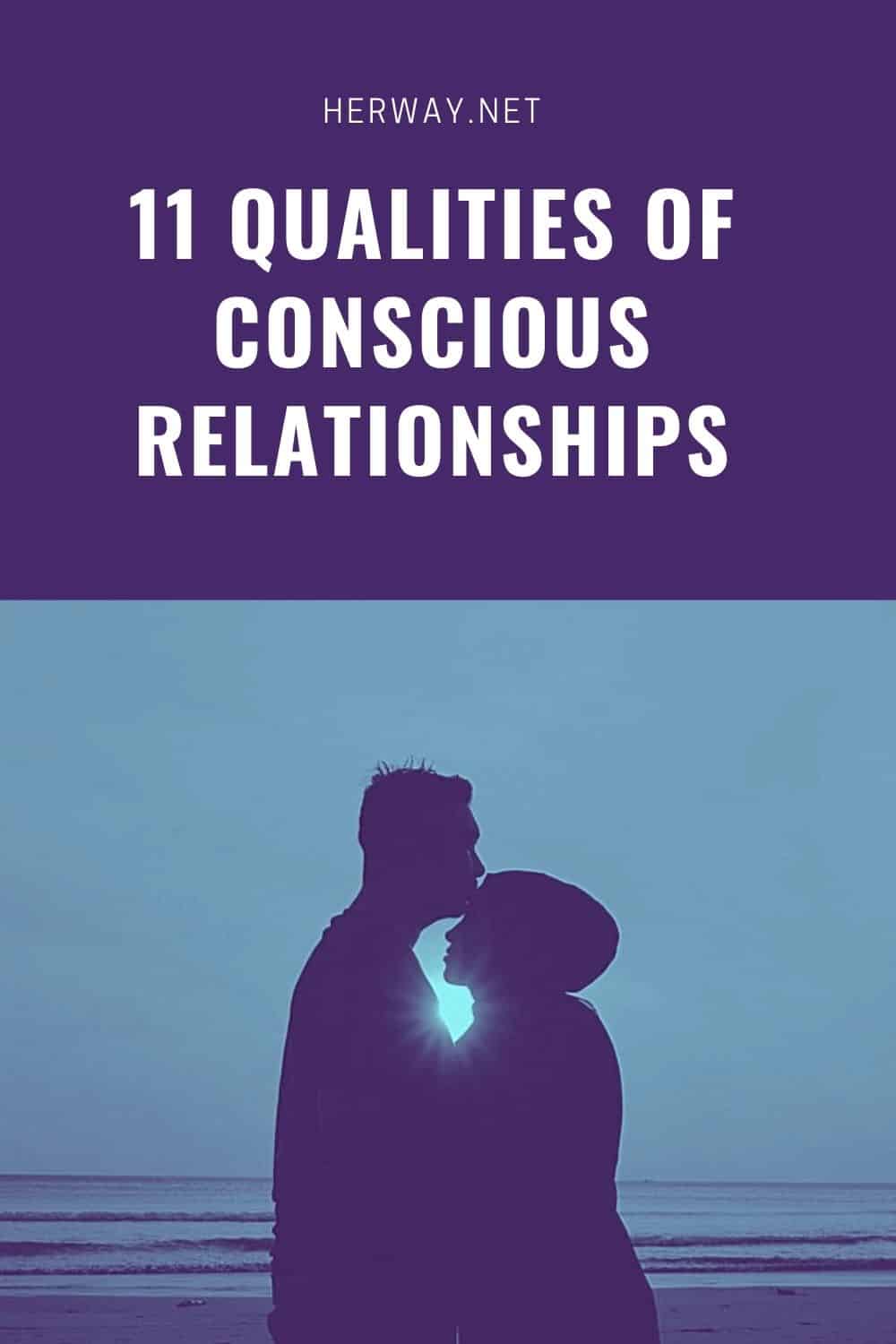11 cualidades de las relaciones conscientes
Hay una nueva era y un nuevo paradigma para las relaciones románticas.
Un tiempo en el que debes olvidarte de todas tus viejas patrones de citas and move toward a new type of romance – toward conscious relationships.
Las relaciones conscientes te empoderan y te dan la oportunidad de crecer.
Son relaciones nuevas, en las que puedes ser tú mismo y satisfacer tus necesidades de amor, seguridad, aceptación y respeto.
Sounds just about perfect, doesn’t it? Well, here are 11 qualities of conscious relationships and a guide on how to have one.
Amor propio y autocuidado

La primera y principal diferencia entre las relaciones conscientes y las tradicionales es que las relaciones conscientes giran en torno a ti, no al romance.
No, this doesn’t mean that you don’t care about your relationship.
It certainly does not mean that you and your partner don’t share an intense conscious love for each other.
Sin embargo, amor propio and self-care always come first. This approach doesn’t make you selfish and self-centered.
Es sólo una señal de que, como pareja, sois lo bastante maduros para saber que tenéis que poneros a vosotros primero, pase lo que pase.
You see, real life is not a fairytale and you’re both perfectly aware of that fact.
Aunque crees en tu romance, sabes que las cosas pueden llegar a su fin.
So, your entire identity doesn’t revolve around your relationship.
En cambio, sabes que la relación que tienes contigo mismo es la número uno.

It’s the only one that will never end or go away. You’re stuck with yourself for the rest of your life, so you better make the journey worthwhile.
Por lo tanto, la relación contigo mismo es la que más aprecias.
Por mucho que te preocupes por tu pareja, siempre te preocupas más por ti mismo.
En pocas palabras, cuida de ti mismo. Cuida su salud mental, emocional y física.
It’s not that you don’t give a damn about your partner’s needs and well being but you’ll never put them before your own needs and well being.
Your happiness is your responsibility and you don’t expect your boyfriend or girlfriend to magically resolve all of your problems just by coming into your life.
En lugar de eso, tu mayor y más importante objetivo es sentirte bien.
You know that you can’t expect someone else to love you unless you do it yourself.
You can’t expect your partner to appreciate or respect you unless you show a certain amount of self-love and self-respect.
Most of all, you don’t expect them to put you first and you know only you can be your own priority.
Asumir la responsabilidad

A la cabeza de la lista de cualidades de una relación consciente está asumir la responsabilidad.
Esto significa que tú y tu pareja sois dos personas adultas que deben respaldar sus acciones y palabras.
Además, comprendes que ambos entráis en esta relación con vuestro pasado a cuestas.
Ambos traen mucha carga emocional e historia a la mesa.
It means that you’re used to certain dating and relationship patterns.
Crees que algo es aceptable mientras que tu pareja tiene hábitos de relación diferentes.
However, this doesn’t make either of you wrong. It just means that you have two different points of view.
Cuando esto ocurre en las relaciones tradicionales, la mayoría de las parejas asumen que algo va mal a la primera señal de problemas.
Bueno, aquí es donde diferís. En lugar de romper o pelear, ambos reconocen sus errores.
No hay que culpar a la otra persona de que tu relación vaya cuesta abajo.

No existe eso de considerarse perfecto mientras que la otra persona es siempre culpable.
En lugar de pensar en las cosas que tu pareja podría hacer de otra manera, céntrate en ti mismo.
Analizas tus errores y cómo puedes corregirlos de la mejor manera posible.
You’re mature enough to dig into your past and see how it affects your present.
¿Cuáles son sus factores desencadenantes y traumas y cómo influyen en su situación sentimental actual?
You see, it’s quite easy to always accuse the other person of being the bad guy.
Sin embargo, a veces es necesario ser honesto y preguntarse cuáles son sus hábitos tóxicos.
¿Cuáles son tus patrones de citas y relaciones que necesitas cambiar? ¿Cuáles son las habilidades de pareja que tienes que mejorar?
¿Cuáles son los mecanismos de afrontamiento a los que necesitas adaptarte? ¿Cuáles son las partes de tu personalidad que necesitas sanar?
Nadie más que tú puede dar respuesta a estas preguntas.
Only when you’re mature enough to get to the bottom of things yourself will you be able to call yourself completely responsible and ready for a conscious relationship.
Vivacidad y crecimiento personal

Una relación consciente consiste en crecimiento personal and achieving your soul’s purpose.
It’s about becoming the best possible version of yourself, despite your romance.
En realidad, es la unión de dos personas deseosas de aprender durante toda su relación, durante el resto de sus vidas.
Este tipo de relación sirve como oportunidad para mejorar, para trabajar en ti mismo y para llevar tu personalidad al siguiente nivel.
It’s a platform to learn from each other, from yourself, from your mistakes, and from the world.
Being in a conscious relationship means you don’t tienen problemas de ego. You don’t feel threatened by your partner’s success.
When you realize that you’re not right, you don’t see it as a personal attack.
En lugar de eso, lo ves como una oportunidad para trabajar en tus propios defectos y convertirte por fin en la persona que estabas destinada a ser desde el principio.
You’re open to criticism and to new experiences. Your spiritual growth and soul’s journey are the most important things.
Y lo más importante: este tipo de relación es una oportunidad única para sanar.
You use it as a chance to get over all of your traumas, to throw away the emotional baggage that’s been weighing you down, to acquire your soul’s purpose, and to overcome all of your heartbreaks.
En las relaciones tradicionales, todo gira en torno a la competencia.

Many couples actually want to outsmart the other person and show them that they’re wiser, more capable, and more successful in general.
En consecuencia, acabas en una relación en la que una persona es sumisa y la otra dominante; una es la líder y la otra la seguidora.
You end up in a situation where one person shuts down the other’s ambitions and where there is no space for individual growth.
Ahora, todo eso forma parte del pasado. De hecho, tu pareja se convierte en tu fan número uno.
They’re the one who gives you a sense of aliveness and the one who makes you feel like you matter.
Se convierten en tu mayor inspiración y en quienes te empujan hacia el siguiente nivel.
You believe in each other, empower one another, and have each other’s back.
El crecimiento personal incluye la valentía de salir de la zona de confort.
El valor de ver lo que está fuera de tu zona de confort mental, emocional y físico.
Significa adentrarse en lo desconocido. Dar un salto hacia el futuro y dejar atrás el pasado.
Sin embargo, el crecimiento colectivo es tan importante como el individual.
El crecimiento colectivo significa que también crecéis como pareja y que vuestro amor romántico alcanza su punto álgido con el tiempo.
Reconocimiento mutuo

Nadie te pide que estés eternamente agradecido por todo lo que tu novio o novia hace por ti.
Después de todo, hay algunas cosas que debes esperar en una relación, y que forman parte de tu normas.
Basically, what I’m trying to say is that you shouldn’t be in a submissive relationship just because your partner helped you out.
There’s no need to be grateful just because they’re faithful and not abusive.
Sin embargo, debes apreciar todo lo que hacen por ti, aunque sólo sea por el bien de vuestro romance.
Y lo más importante: apreciar el hecho de que te quierote respetan y están ahí para ti, pase lo que pase.
Aprecie sus sacrificios y su energía. Aprecie su inversión, devoción y compromiso con su romance.
Asegúrate de que sepan lo bendecido que te sientes por tenerlos cerca.
Show them that you’re proud of being their life partner and that you consider yourself lucky to have the privilege of holding their hand.
Nevertheless, don’t forget to appreciate yourself as well. Appreciate your own time and effort that you put into the relationship.
Respeto y práctica de la aceptación

In “regular” relationships, people change for the sake of their partner. In fact, this change starts even before they enter an actual romance.
While you’re in the dating pool, you are in a state of constant worry whether people of the opposite sex will like you or not.
Te esfuerzas por ser más atractivo y apetecible.
En consecuencia, con el tiempo, empiezas a piérdete, bit by bit. You erase the parts of your personality that you assume others won’t like.
Luego, cuando encuentras pareja, haces todo lo posible para que piense mejor de ti.
It’s not that you’re consciously deceiving them but without being aware of what you’re doing, you involuntarily present yourself in a different light.
Más tarde, sigues comprometiéndote contigo mismo.
After some time, you realize you’re a completely different person than you were before you entered the romance.
No, I’m not talking about growth here because that is always welcome.
I’m talking about the fact that both you and your partner changed the essence of who you are.
Naturalmente, todo esto empieza a frustrarte. Acusas a tu novio o novia de hacerte encajar en sus estándares.

The worst part is that you no longer love yourself. You don’t know the person you’ve become and you lose a lot of self-love.
Well, this is where conscious relationships are different. In fact, they’re all about the practice of acceptance and respect.
Both you and your partner respect each other’s individuality. You respect each other’s boundaries and pasts.
Aceptas el hecho de que tu pareja tenga su propio conjunto de valores morales y que tenga su propia opinión, que puede ser diferente a la tuya.
They’re not your clone – they are a person with their needs, desires, feelings, and a brain.
What’s more – you respect the fact that you both have separate lives outside of your relationship.
Respetas a sus amigos, familia, carreras, aficiones e intereses sin el deseo de interferir.
En lo que respecta a la aceptación, lo fundamental es que no hay necesidad de cambiarse a uno mismo por el bien de una relación.
You both love one another’s flaws and you don’t try to annul them.
Your partner loves your true self. They love you because of your imperfections since they know they’re also a part of your personality.
Presencia

Cuando afirmo que la presencia es esencial para relación sana, I’m not referring to the fact that you and your partner should spend every second of every day together in order for your romance to succeed.
After all, we’ve already talked about how you are separate individuals.
Significa que tienes derecho a tener tus propios intereses, a pasar tiempo con otras personas y a tener suficiente tiempo a solas.
In fact, I’m referring to something else. Yes, spending enough time with your loved one is extremely important.
Sin embargo, pasar tiempo de calidad es aún más crucial.
No significa nada si pasas el tiempo con tu pareja en conversaciones triviales o mientras ambos estáis con vuestros teléfonos, sin comunicaros realmente.
It’s much better to see your partner a few times a week (if you don’t live together) where you are alone and completely focused on each other, without your phones and social media, than to see them every day without actually talking to each other.
On the other hand, if you live together, being in the same room doesn’t equal spending time together.
En lugar de eso, asegúrate de tener siempre algo de tiempo a solas para los dos, sin el resto de tu familia o amigos.
Independientemente del tiempo que llevéis juntos, convierte las citas en un hábito.

Tengan una cita al menos una vez a la semana y escúchense atentamente, sin distracciones.
I know that this might sound like mission impossible in today’s world, where we all lead extremely busy lives but if you want to be a conscious couple, this is a practice that will bring you there.
Presencia significa que usted sabe que su ser querido siempre está ahí, incluso cuando ambos están físicamente distantes.
Significa que nunca sientes su ausencia.
It means that you’re both one hundred percent present in your relationship, next to each other.
That your mind is not somewhere else while you behave like you’re being forced to sit or sleep together.
La presencia incluye devoción y esfuerzo.
Significa tener rituales regulares que construyan una conexión y un vínculo profundo entre vosotros.
Presence means intimacy. Of course, I’m not referring to physical intimacy in the bedroom here only, even though it is also a significant aspect of every romantic relationship.
Instead, I’m talking about the importance of eye contact, holding hands, and hugging each other. I’m talking about building trust and friendship.
Seguridad para practicar el amor

Even though you’re a strong, independent individual, you still need a safe place.
A place where you can be your true self, in which you feel secure and protected and where you won’t be judged for anything you do or say.
Pues bien, para las parejas conscientes, esta zona segura es su relación íntima.
Una zona donde se sientan ellos mismos y donde no haya ningún peligro que pueda afectar a su salud mental o emocional.
En otras relaciones románticas, muchas parejas tienen miedo de mostrar sus verdaderas emociones.
Esto es especialmente cierto en el caso de las citas modernas.
When you first enter a new relationship, you don’t want them to see how crazy in love you are with them.
Ambos juegan juegos mentales entre sí.
You play hard to get because you don’t want to be taken for granted.

You keep your emotions to yourself because you don’t want to be taken advantage of.
You pretend to be heartless since you think it’s the only way to keep your heart from being broken.
You wait for the other person to be the first one to say “I love you” because you don’t want to be seen as a fool.
Even if your partner hurts you, you don’t tell them anything directly. Instead, you find a way to pay them back.
Al fin y al cabo, tu principal objetivo es que no te consideren débil.
You put thick walls around yourself since you think it’s the only way not to be hurt.
Sounds familiar, right? Well, luckily, conscious relationships don’t work like that.
Por el contrario, son un entorno seguro en el que puedes practicar el amor consciente de todas las formas que consideres adecuadas.
An environment where you don’t have to be afraid of showing your true feelings and where you’re not expected to suppress your emotions.

Aquí puede mostrar cada una de sus lados vulnerablessin temor a que tus puntos débiles se utilicen en tu contra.
En este tipo de relación íntima, todos los sentimientos son bienvenidos.
You don’t have to be ashamed of your emotions and you can openly discuss each one of them with your loved one.
It’s okay to be angry, sad, resentful, or even have the desire for revenge. After all, you’re a human being.
Sin embargo, la clave está en ser consciente de todas tus emociones, especialmente de las negativas.
Y lo que es más importante, el truco está en compartirlos con tu pareja, sin miedo a ser juzgado.
I won’t lie to you: there are times when this is difficult.
Sin embargo, en lugar de atacar a tu ser querido por estar enfadado contigo y verte a ti mismo como víctima de la situación, haz otra cosa.
Permítales reconocer sus emociones y cree un espacio en el que puedan expresarlas.
Comunicación sana y conflicto productivo

Una comunicación sana es la clave de toda relación sanaespecialmente a los románticos.
You can’t expect to succeed in an environment where things such as mutual understanding and listening don’t exist.
En una situación en la que comunicación, you’re allowed to speak your mind.
Naturally, respect is always required, so it’s never acceptable to insult the other person with your attitudes or opinions.
However, you don’t have to agree with everything your partner says or does.
In fact, you’re always allowed to call them out on their actions and tell them that they’re making a mistake.
No se trata de complacer a la gente ni de asentir con la cabeza para mantener la paz en la relación.
In fact, even when you don’t share the same opinion on a certain matter, you are mature enough that you can agree to disagree.
The same goes for fighting. At first, you might assume that conscious couples don’t fight.

Well, that couldn’t be further from the truth. In fact, they argue just as often as any other regular couple.
Sin embargo, la diferencia radica en su forma de pelear. Verás, sus argumentos son siempre productivos y tienen razón de ser.
They don’t pick unnecessary fights just because they’re nervous or had a bad day.
They don’t take their stress out on their partners and never make a drama out of nothing.
En cambio, sólo luchan cuando hay un motivo para ello.
Even when they’re in the middle of the argument, they always treat their partner with respect and they never forget that they’re confronting the person they love the most.
El ego queda fuera de la ecuación.
It doesn’t matter who is right or wrong – the only thing that matters is coming up with a solution using joint forces.
In their arguments, it’s never one person against the other. It’s always both of them united against the problem.
Compasión

Empatía es una cualidad que toda persona madura debe poseer.
It’s extremely significant to think about other people’s well being, needs, feelings, and desires.
Pues imagínate lo crucial que es sentir empatía hacia alguien con quien compartes el amor romántico y a quien consideras tu alma gemela.
Even though you were told that you should put yourself first in this relationship, I can’t stress enough how important it is not to be selfish during this process.
En cambio, si quieres que tu romance consciente funcione, tanto tú como tu pareja tenéis que mostrar un sorprendente nivel de compasión el uno hacia el otro.
Remember: you’re not alone in this relationship. There are two of you and you should function as a team.
Therefore, please, always have each other’s feelings in mind.
Hagas lo que hagas, piensa en cómo puede afectar a tu relación y a tu ser querido.
Haz todo lo posible por ponerte en su lugar. Mira las cosas desde su punto de vista y ten siempre en cuenta su perspectiva.
Desapego del resultado de la relación

Las parejas en este tipo de relaciones no se obsesionan con el futuro de su relación.
No, this doesn’t mean that they live day by day, without worrying about what will happen tomorrow.
Sin embargo, ponen toda su energía en hacer que las cosas funcionen de la mejor manera posible en estos momentos.
Son cuidadosos en cada paso del camino y disfrutan del momento presente.
You see, for them, it’s all about the journey – not about the final destination.
When you hear things like this, you assume that means they couldn’t care less about what happens to their relationship.
It’s as if they don’t care whether they’ll manage to grow old together or if their relationship will break down the very next day.
Well, this couldn’t be further from the truth. Instead, they’re just not obsessed with it, nor do they allow pensando demasiado para arruinar su presencia.
Estas parejas se preocupan más por la experiencia que les aporta su relación.
Centran su atención en su crecimiento y en las lecciones que pueden aprender a través de este proceso.
Interdependencia en lugar de codependencia

Las relaciones tóxicas consisten en codependencia. En este tipo de relaciones, lo que más te mueve es el miedo.
You’re afraid of ending up alone because you think you can’t live without your partner as they’re the one who gives you a sense of purpose.
You’re scared of them abandoning you and you’re ready to do whatever it takes to keep them by your side, even if that will make you unhappy.
En pocas palabras, sientes que dependes emocionalmente de tu pareja.
Tus estados de ánimo, pensamientos y sentimientos están controlados por ellos y pierdes tu individualidad.
On the other hand, conscious relationships are not codependent – they’re interdependent.
Eso significa que no son adictos el uno al otro, pero funcionan juntos.
Os apreciáis mutuamente, pero os apreciáis aún más y sólo vosotros os dais un sentido a vosotros mismos.
Aprecias la intimidad que tienes con tu pareja, pero tu sentido del yo siempre es lo primero.
You spend time together but do not act like conjoined twins. You’re a team but have healthy boundaries.








